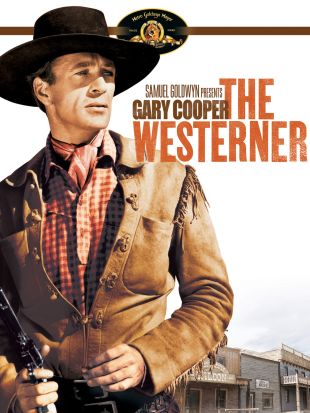You don't have to love, or even like Westerns to love William Wyler's The Westerner -- to appreciate it, all one has to do is appreciate great directing and superb acting, and gorgeous cinematography. The directing is by William Wyler, who took the opportunity afforded by a great script, mixing drama and wit in equal measures, to make one of the most beautifully restrained films seen in the Western genre since the advent of talking pictures. The Westerner is such a quiet movie, its performances so low-key that it is almost a genre-destroying effort -- even John Ford's Stagecoach, made the year before, is so extroverted in its sensibilities as to look almost crude by comparison. There's a psychological darkness that hangs over the action and characterizations in The Westerner that made it much more serious viewing than even Stagecoach had seemed, though it also possesses a great deal of humor -- also much more so than Stagecoach. Wyler, who had rushed through the making of Westerns during the silent era, decided to show the world what could be done with a carefully made Western, done with restraint and an eye for quality in the performances and photography. He was aided and abetted in this goal by producer Samuel Goldwyn, who only made quality pictures -- and who believed any movie worth making by him was worth making well -- and by his two leads, Gary Cooper and Walter Brennan. Cooper could always be relied upon to under-act -- it was part of his charm -- but Brennan was the real miracle here, his acting so internalized and natural that his every breath and every flick of an eye-lid is riveting.
It is impossible not to believe completely in his Judge Roy Bean's warped sense of justice, his obsession with Lily Langtry, and his sudden, hopeful (yet erroneous) recognition of Cooper's Cole Hardin as a kindred spirit -- or his sense of betrayal when Hardin rides away, declining his offer to join the judge in his larcenous activities. Indeed, the script and the movie offer as complex a relationship between two men as any movie of its era. Cooper's character is convincingly wary yet respectful of Brennan's Judge Bean, and sees some sign in the corrupt, murderous judge of something potentially decent; Hardin is also compelled to save the judge from a lynching party, even knocking him out cold for his own good. In many respects, this was the first modern buddy movie, paralleling elements of Each Dawn I Die, and its relationship between the James Cagney and George Raft characters. The scene in which Hardin pulls out the long-awaited lock of Lily Langtry's hair is played so beautifully and carried so long that it's humorous in what it says about filmmaking. Cooper may crack Brennan's neck once too often for the joke to work, but the movie still manages to maintain a careful balance between humor and seriousness throughout.
Alfred Newman's score (credited to Dimitri Tiomkin) is nicely restrained until the sentimental finale, where the composer can indulge his most romantic impulses, such as scoring the scene of the dying judge going to meet Miss Langtry to "The Unquiet Grave" (also known as "Dives and Lazarus," or "Diverus and Lazarus"), with "Dixie" accompanying his actual demise, in keeping with the old dress uniform she is wearing from better days. And the photography by Gregg Toland is filled with gorgeously lit and composed shots, interiors and exteriors alike, making this movie 100 minutes well spent for the eye as well -- what's more, Wyler's directing and Toland's shooting of the prairie fire sequence is one of the great spectacles of 1930s cinema, as well as an incredibly exciting scene.
